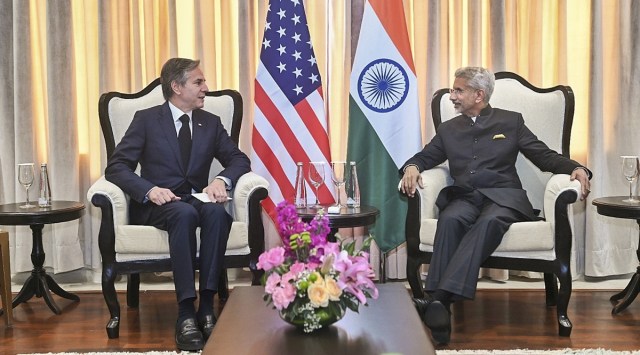While, on the surface, this is a repeat of stated positions, what is significant is that both US and India said that the outcome document was approved by an overwhelming majority. In what marks a calibrated step forward, Washington backed Delhi’s statement that the Chair’s summary – put out by India as Chair of the G-20 — was a product of consensus on a variety of issues.

 This combination of photos shows US Secretary of State Antony Blinken, right, and Russian Foreign Minister Sergey Lavrov, left, attend the G20 foreign ministers’ meeting, respectively, in New Delhi, March 2, 2023. (AP)
This combination of photos shows US Secretary of State Antony Blinken, right, and Russian Foreign Minister Sergey Lavrov, left, attend the G20 foreign ministers’ meeting, respectively, in New Delhi, March 2, 2023. (AP)
This is the second time in a week that the G-20 ministerial has failed to come to a consensus — the G-20 Finance Ministers’ meeting in Bangalore could not come up with a communique. India, as the chair of the G-20 meeting, came with a Chair’s summary.
After the G-20 ministers’ meeting, External Affairs Minister S Jaishankar said: “There were differences on the Ukraine conflict which we could not reconcile.” He said that while the Bali declaration had a consensus, some countries felt that it cannot be extrapolated, referring to Russia and China.
However, he sought to clarify that while there was consensus on “95 per cent” of the issues, there was none on two paragraphs. “Everyone was not on the same page on those two paragraphs,” he said.
Echoing India’s position, Secretary of State Antony Blinken said, “What we have seen is the outcome document that reflected the shared agreements on many issues by all foreign ministers.”
 External Affairs Minister S Jaishankar with Foreign Minister of Russia Sergey Lavrov in New Delhi on Wednesday. (PTI)
External Affairs Minister S Jaishankar with Foreign Minister of Russia Sergey Lavrov in New Delhi on Wednesday. (PTI)
He said that there is a broad consensus on the Russian-Ukraine war within the G-20 except for two countries which he called “outliers” and “holdouts”. He didn’t mince his words calling out Russia and China as the two.
Story continues below this ad
The opposition by these two on references to the Russian invasion resulted in the meeting coming to an end without the joint communique despite India’s efforts to bridge the differences.
“Russia and China were the only countries that made it clear that they would not sign on to that text,” Blinken said at a press conference, hours after he had a brief meeting with Russian Foreign Minister Sergey Lavrov.
He said that the US strongly supports India’s agenda for G20. As consensus eluded on the joint communique, the meeting held under India’s presidency, adopted a Chair’s Summary and Outcome document listing various key priorities for the grouping.
The contentious paragraphs in the Chair’s summary are Paras 3 and 4.
Story continues below this ad
Para 3 read: “The war in Ukraine has further adversely impacted the global economy. There was a discussion on the issue. We reiterated our national positions as expressed in other fora, including the UN Security Council and the UN General Assembly, which, in Resolution No. ES-11/1 dated 2 March 2022, as adopted by majority vote (141 votes for, 5 against, 35 abstentions, 12 absent) deplores in the strongest terms the aggression by the Russian Federation against Ukraine and demands its complete and unconditional withdrawal from the territory of Ukraine.
“Most members strongly condemned the war in Ukraine and stressed it is causing immense human suffering and exacerbating existing fragilities in the global economy – constraining growth, increasing inflation, disrupting supply chains, heightening energy and food insecurity, and elevating financial stability risks. There were other views and different assessments of the situation and sanctions. Recognizing that the G20 is not the forum to resolve security issues, we acknowledge that security issues can have significant consequences for the global economy.”
And Para 4 read: “It is essential to uphold international law and the multilateral system that safeguards peace and stability. This includes defending all the Purposes and Principles enshrined in the Charter of the United Nations and adhering to international humanitarian law, including the protection of civilians and infrastructure in armed conflicts. The use or threat of use of nuclear weapons is inadmissible. The peaceful resolution of conflicts, efforts to address crises, as well as diplomacy and dialogue, are vital. Today’s era must not be of war.”
There was a footnote in the Chair’s Summary that these Paragraphs 3 and 4, as taken from the G20 Bali Leaders’ Declaration (15-16 November 2022), were agreed to by all member countries except Russia and China.
Story continues below this ad
This was a similar formulation as in the G-20 Finance ministers’ meeting in Bangalore.
Said Jaishankar: “I would say in terms of the outcome document… you will see that, almost, I would say, what 95% in terms of paragraph agreement, and it is just on two paragraphs that we were not able to get everybody on the same page or same para as you might call it… I would urge you really to look on the fact that, substantively, on the key development issues — issues of debt, finance, food, fuel, health, climate, this meeting was able to get everybody around the table and as I said, you know, this is no easy task given the state of polarization in the world.”
Jaishankar said that in the Bali declaration, “we were able to forge a consensus, but after Bali, some events have taken place…We tried to bridge the gap.”
Lavrov, in his remarks, said: “The West has sacrificed to its ambitions in Ukrainian affairs all areas of work that should constitute the core of the G20’s activities…I would like to apologize to the Indian chairmanship and our colleagues from the countries of the Global South for the improper behaviour of some Western delegations that turned the work on the G20 agenda into a farce in an attempt to shift the blame for their economic failures primarily to Russia.”



 This combination of photos shows US Secretary of State Antony Blinken, right, and Russian Foreign Minister Sergey Lavrov, left, attend the G20 foreign ministers’ meeting, respectively, in New Delhi, March 2, 2023. (AP)
This combination of photos shows US Secretary of State Antony Blinken, right, and Russian Foreign Minister Sergey Lavrov, left, attend the G20 foreign ministers’ meeting, respectively, in New Delhi, March 2, 2023. (AP) External Affairs Minister S Jaishankar with Foreign Minister of Russia Sergey Lavrov in New Delhi on Wednesday. (PTI)
External Affairs Minister S Jaishankar with Foreign Minister of Russia Sergey Lavrov in New Delhi on Wednesday. (PTI)





